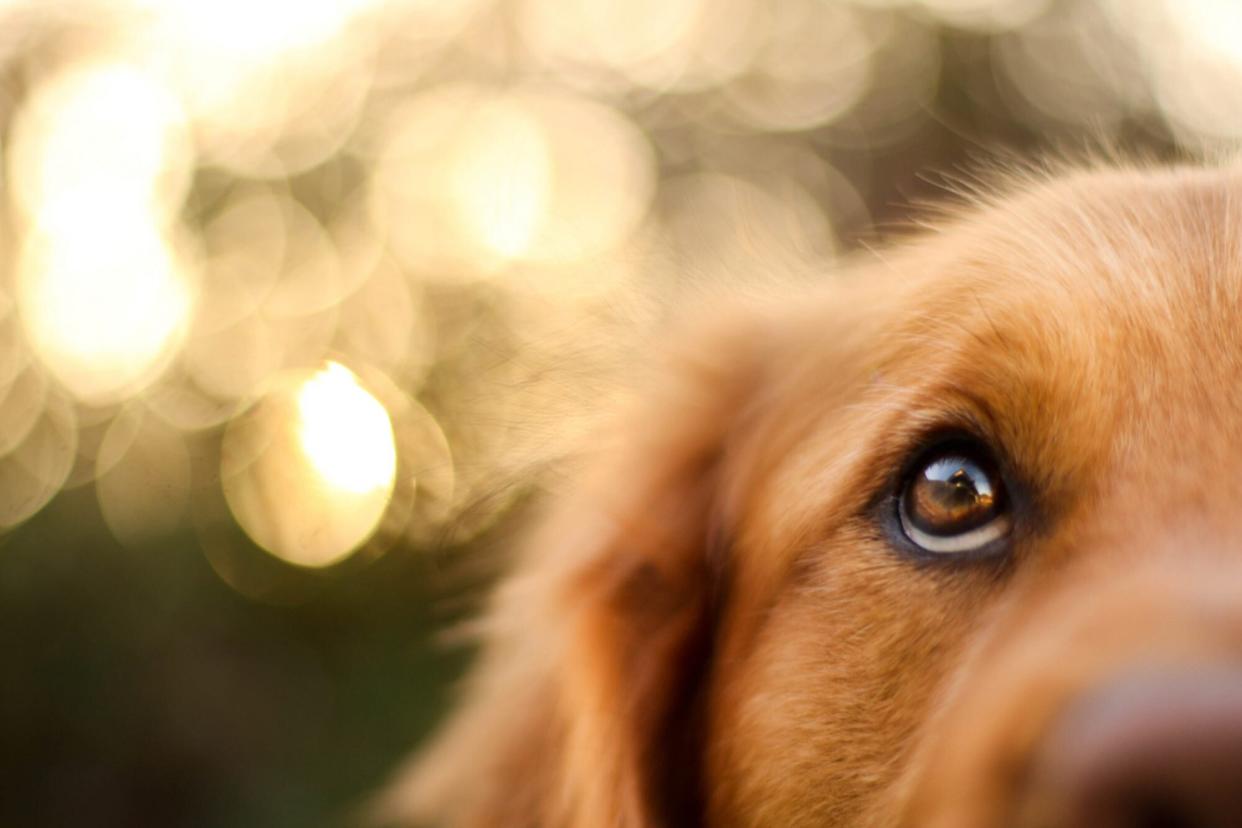Can Dogs See Ghosts? Here's What the Experts Say

Jessica Trinh / Getty
TABLE OF CONTENTS
On This Page
How Do Dogs' Senses Differ From Humans'?
Do Dogs Really See Ghosts or Spirits?
Have you awoken to the startling sound of your dog insisting he's detected a threat in the middle of the night, and then you discover it's ... nothing? Or is it?
Wondering if your pup is seeing spirits may say more about your own beliefs than it does about your pet. According to YouGov's 2019 poll, more than four in 10 Americans believe paranormal entities like ghosts, demons, and other supernatural beings exist. Over one-third said they have first-hand experience feeling the presence of a spirit or ghost. Jinkies!
Whether you've personally experienced your dog acting out-of-the-ordinary or have heard tales from fellow pet parents, it can be unsettling to think about potentially living with something you cannot see. (Unless it's Casper, of course.) As you speed walk down your dark hallway, you may wonder, can dogs see ghosts? We talked with dog experts, including a Certified Animal Behavior Consultant (CABC) and a veterinarian, to explore this topic.
How Do Dogs' Senses Differ From Humans'?
Humans and dogs share the same five senses: sight, touch, hearing, taste, and smell. But dogs are amazing furry beings (obviously) and there's plenty they can do that we humans aren't capable of, which is what makes them all the more fascinating and lovable.
"Dogs can see better in low light conditions than we can," says Jo Myers, DVM of Salida, Colo. and telehealth practitioner on Vetster. Not only that, but dogs (and cats) can hear higher frequencies than we humans can.
"They [dogs] can hear about four times what we can and smell up to 10,000 times better than human beings," says Jen Jones, dog expert and founder of Your Dog Advisor. "Many dogs have such keen senses that they can even sniff out cancer or predict when a seizure is about to happen." Of course, those dogs have special training for those tasks.
RELATED: Can Dogs See Color? The Truth About Color Blindness in Dogs
Do Dogs See Ghosts or Spirits? Here's What May Really Be Going On
There are plausible explanations for certain behaviors that might lead pet parents to believe their dog is seeing a ghost.
1. Your Dog Sees, Smells, or Hears Something You Can't
It's all thanks to those super senses.
"When your dog reacts to something you can't see, rather than a ghost, he may instead react to scent left hours or days ago, or sounds of critters outside the house," explains Amy Shojai, CABC and pet care expert. She also tells us that some dogs are aware of changes in the emotional state of the people they love, and may "react out of fear, excitement, or other emotions they perceive in you." Because dogs are able to differentiate between certain human emotions, they may simply be reacting to the emotions of the people around them.
Your dog's efficient hearing also aids them in detecting commotion that we humans might not perceive. "Although dogs and humans hear approximately the same low-pitched sounds, dogs hear much better than people at higher frequencies," Shojai explains. And Fido's super sniffer helps him out too. "Humans have about five to 20 million scent-analyzing cells compared to the dog's 12.5 to 300 million," Shojai says.
2. Your Dog May Have a Physical Condition
The external environment around them might not be the only reason your pup is acting differently than usual. It could be something physical. "In both dogs and cats, as they age and senses fade, behaviors may change. Cognitive issues can also make pets act and react in unexpected, inexplicable ways," Shojai says.
If a client asked Myers whether their pet could see ghosts, "I would ask them some questions with the intent of getting a better history," she says. "My goal would be to avoid missing a medical condition that could be contributing to these behaviors."
The first thing that comes to mind, she says, is potentially an anxiety disorder. "Many dogs with anxiety experience a frequent or even constant state of hypervigilance," Myers explains. "When you combine this with the fact that dogs hear and smell better than we do, there's a variety of things that could trigger a reaction from a dog that aren't on our sensory radar. A mouse crawling in the attic or the scent of an animal walking by outside a window are all valid triggers that warrant a response from a vigilant dog."
A degenerative disorder in aging dogs known as Cognitive Dysfunction Syndrome (CDS) could also be the cause of your dog's changing behavior. According to Myers, signs of dementia in dogs can include:
Restlessness
Aimless pacing
Staring off into space
House soiling problems
Lethargy
Decreased interest in play or other activities
Decreased responsiveness to family members and other pets
Altered sleep patterns
If your dog's anxiety begins or worsens or in the late afternoon or night, talk to your vet about the possibility of Sundowner's Syndrome, a state of confusion sometimes seen in people with Alzheimer's disease.
Before you start panicking about your dog being sick, especially if behavior changes are temporary or infrequent, realize it's quite possible they just heard neighbors walking and talking along the sidewalk, saw a quick reflection of a car's headlights, or caught the scent of a critter in the backyard. Or, perhaps your pup senses you're feeling spooked and can't help but feel the same!
We know these explanations might not be as exciting as ghosts, but at least you'll sleep better, right?

